Teenagers From Outer Space by Asimo
Introduction
Original SA post
It's April Fools, let's start this off right.

 TEENAGERS FROM OUTER SPACE - Introduction!
TEENAGERS FROM OUTER SPACE - Introduction!

There's been a lot of RPGs over the years. A loooot. Many of them were good and have held on in various editions, others were bad and fell through the cracks and rightfully forgotten. Unfortunately, some were pretty great and still went out of gamer perception, simply because they were niche at the time or because they haven't been printed in years. For example... I'm sure everyone here loves anime games! ... Right? ... Well, fine. But I don't mean any of that modern Moe crap. Think older! Way older! As in... clearly based on an
anime that started circa 1981
...? That's right, it's 1987's
Teenagers from Outer Space
, by
Mike Pondsmith
!
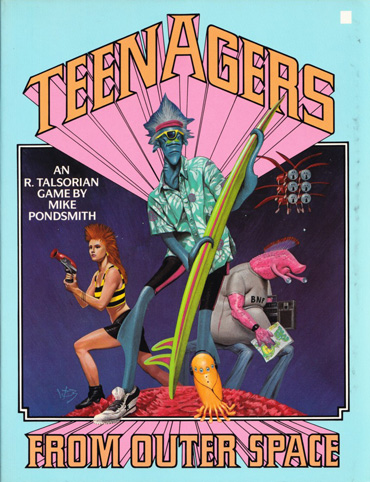
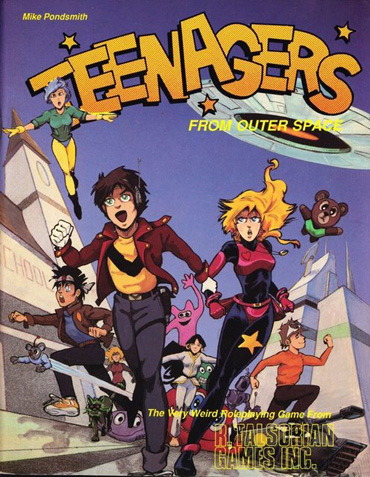
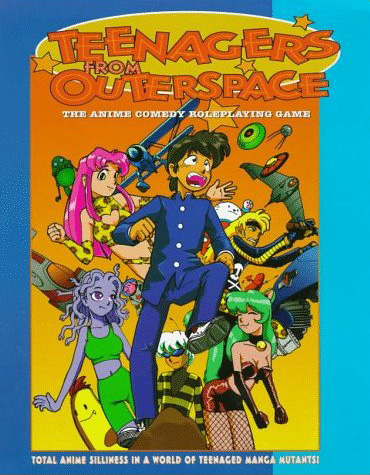
That's the first printing (1987... was that really 26 years ago...?), the second printing (1989), and the second edition/revised version (1997) there. While TFOS is not the oldest anime-based RPG in America -
Mekton
(also from Pondsmith, admittedly...) came out in 1984, and Siembieda's
Robotech
came out in 1986 - it's certainly and sadly one that most people have forgotten about over the years. Despite this it's from a rather
untreaded
genre for RPGs, and one of those earlier RPGs that attempted to actually enforce genre conventions even down to the rule level, being a very simple and almost freeform game. It's a niche that wasn't really touched on for years (the only other example I can think of for ages was
GURPS IOU
, which is another one I'll need to pull off the shelf later...) and even now is still sort of in the realm of experimental indie games. The concept is... pretty much what it says on the title, but if you're also old enough to remember a
contemporary 80's cartoon
that was also a pretty clear inspiration you've probably got close to the right idea anyway.
Short version: There are teenagers. From
space
.

Now, before we get too far into this, I should note a few things: I've got my hands on my copy, which is the second printing version there; it's basically identical to the original run aside from the cover. Downside is, this is an actual
physical
copy and I lack a scanner or even something resembling a decent camera, while the only PDF I could legally find was the
latest edition one
, which while similar in text content has much different art. It's not necessarily
worse
; the old versions had some charmingly cartoonish stuff, while the 1997 version had more blatantly ripoff fauxnime stuff (since while anime hadn't quite taken off yet in the US, the DVD market had made it at least a recognizable niche by then), but you're going to have to suffer through that either way. Sorry!
 I'll give a comparison of the editions later on, but most of it's expanded examples and other such things rather than additional rules. It's not a very big game; the edition I'm reviewing has all of 84 pages, and several of those are taken up by character sheets and similar stuff...
I'll give a comparison of the editions later on, but most of it's expanded examples and other such things rather than additional rules. It's not a very big game; the edition I'm reviewing has all of 84 pages, and several of those are taken up by character sheets and similar stuff...
It's also probably important to talk a bit about Pondsmith himself, too. He's the founder and heart of R. Talsorian Games, which has been in operation since
basically forever
1982, and while it's never been a major company it's had several high profile releases over the years, most notably
Cyberpunk 2013
in 1988 and the later revision
Cyberpunk 2020
in 1990, generally considered (alongside Shadowrun) to be the genre-defining system for 90's era cyberpunk roleplaying. Pondsmith's also a major anime fan - an
oldschool
anime fan, back in the days of crappy VHS fansub bootlegs and horrible dub releases - and once you realize this, the fact CP2020 seems to have more in common with
Bubblegum Crisis
than
Neuromancer
really starts to make sense. Well, that and the fact he did a Bubblegum Crisis (and Dragonball Z...) RPG in the late 90's, when RTG did its ill-fated Fuzion system, but that's something for another review.
Also, Mike Pondsmith is one of the few
black
RPG designers in the industry, leading to depressing and hilarious anecdotes of people at conventions not believing he was actually Mike Pondsmith.
 I'm sure someone here can give more detailed accounts about this than me, though...
I'm sure someone here can give more detailed accounts about this than me, though...
In any case! With all that exciting historical information out of the way we can move on to the introduction! One important thing to note about the game is its layout; there's the main body of (theoretically) serious text, but also sidebars that give examples of the rules being presented, offer commentary about why things are designed like they are, or just provide sarcastic quips about your poor PCs. The first one we see is also the most useful for this review:
Sidebar posted:
The plot of Teenagers from Outer Space is pretty simple. Aliens from Out There invade our planet. They enroll their kids in our schools; shop in our shopping malls; hang out in our fast food joints. It's sort of like " Leave it to Beaver " crossed with the " Twilight Zone ", " The Outer Limits ", and " Alien "
We said this was simple. We didn't say it made sense .
 Er, wait-
Er, wait-
Sidebar posted:
Running a Teenagers game will require skill, determination, and the combined jokebooks of Henny Youngman, Bill Cosby, Robin Williams, and Steve Martin. If you don't happen to have all of this talent in one place, relax. You have this book. Now, don't you feel better?
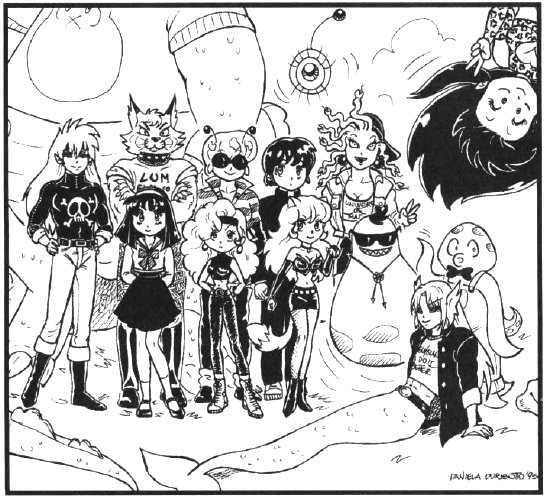
-
Smarts
- How well you brain at things. "A high Smarts score means you can figure out languages, do Hyperdimensional Calculus. and not fumble tying your shoelaces."
-
Bod
- How good you are at physical stuff. Including fighting and shooting and all that, but also athletics or dancing or walking on your hands. "If you have hands, that is."
-
Relationship with Parents
- A base stat I can
guarantee
you have not and will not ever see in another game. Perhaps the most critical thing in the universe, it's explicitly noted that this can go up and down depending on... reasons, though it'll never go above the original roll.
-
Luck
- "If you can't figure out what luck is, you have obviously never really been through high school."
-
Driving
- Another critically important stat for a (space) teenager. I mean if you didn't have it, your
parents
would have to drop you off at school...
-
Looks
- What people think Charisma is. Critically important for high schoolers.
-
Cool
- What Charisma
actually
is. Even more critically important for high schoolers.
-
Bonk
- Somewhat curiously named, but essentially your Hit Points. Not to spoil too much, but TFOS is not exactly a lethal game system... every time you take damage (which can be to one's
ego
as well as one's flesh) you lose a few points of this, and if you ever hit zero you're out of play for as many turns as points you went under (probably twitching on the floor or crying in a corner), at which point you pop back up at full score. That's it. That's the
entire
damage mechanic.
As you can see, this isn't exactly the most serious of rule systems.
 Although there's one other thing I should warn... this game is
incredibly
80's. You don't see it so much just yet, but wait...
Although there's one other thing I should warn... this game is
incredibly
80's. You don't see it so much just yet, but wait...
*Except your parents. And the principal...
Creating your very own teenager!
Original SA post
April 1st isn't over just yet! Let's get some more done here...
 TEENAGERS FROM OUTER SPACE - Creating your very own teenager!
TEENAGERS FROM OUTER SPACE - Creating your very own teenager!

When last we left off, I had given you a brief teaser of what's to come... the base stats of the game! The rather eclectic assortment of
Smarts
,
Bod
,
Relationship with Parents
(RWP),
Luck
,
Driving
,
Looks
,
Cool
, and
Bonk
. Now, you might be wondering that these stats probably aren't all created equal, and... well, you'd be right. But it's a comedy game, not a competition, so does it really matter?
... Besides, it's 1987. Chargen is random.

Okay, honestly by then there were plenty of games with point-buy style systems, following in Champion's wake. It's chosen here quite intentionally to help make sure characters have (sometimes inexplicable) strengths and weaknesses, because it's funnier that way. And don't worry, TFOS has none of that "roll 3d6, down the line" crap that people think oldschool D&D had! Here it's
1D6
down the line! Yep, it's not very complex... roll a die for each stat, get a result from 1 to 6, and that's what the stat is. Higher is better ... generally, but we'll get into that later. Fortunately the game is fairly generous here; you can move points between stats as you like, as long as none go below 1 or above 6. Convenient!
(Now for folks with more modern gaming sensibilities, you could probably just give everyone 25 points to distribute around or something and skip the rolling so the entire party's on an even level, but considering it's literally impossible for a character to die in TFOS and the point of the game is humor, there's something to be said for just going with random as it is. You'll see.)
Now, while TFOS is a rules-light game this is probably a bit too simple, so characters are also allowed to have
skills
specialties
non-weapon proficiencies
knacks, basically specific things they're really good at! Or... at least better at than their traits would otherwise indicate. They're loosely paired with stats and add onto a roll when it relates to that particular knack, so something like "baseball star" would match up with Bod, "quantum hyperphysicist" with Smarts, or "daddy's little angel" with RWP.
 Players roll a die, and however many points they have is how many can be spent on knacks, though it can be split however you want; if you rolled a two for example, you could have a single 2-point knack or two 1-point knacks.
Players roll a die, and however many points they have is how many can be spent on knacks, though it can be split however you want; if you rolled a two for example, you could have a single 2-point knack or two 1-point knacks.
(This is another case where it wouldn't be too hard to just give out a flat number if you were so inclined. But...)
While rolling up stats and knacks is pretty simple, it's obvious that there can be some imbalance between characters. Someone might have an unlovable loser with near-minimum stats, and someone might roll the child of
Superman and Wonder Woman
who is invulnerable in battle and has the infinite adoration of their peers. But never fear! Because, as mentioned several times, this is a comedy game... so "success" is in the eye of the beholder. While we won't get into the exact resolution rules until later, it's important to note now that it isn't a binary fail/success mechanic. Indeed, you can fail, you can succeed, or you can succeed
too well
, at which point the GM is highly encouraged to inflict whatever hilarious comeuppance is best fitting. Succeed too well on an attack, blow up half a city block and get community service after school. Do too well trying to woo a date, and you've now acquired your own creepy stalker. In most games this would be obnoxious, but since the whole point of TFOS is watching things go horribly wrong, well...
And the worst part? The players aren't allowed to know how good is too good.
Okay okay, it's another simple mechanic. At the start of each session the GM secretly rolls a die, and if a player succeeds on a roll by more than that amount during the session, hilarity ensues.

Of course, stats are only part of marking a character! There's who they are... or perhaps
what
. While it's mostly for narrative's sake, PCs can be human, near human (your average star trek forehead alien), not very near human (your average star wars alien with head tentacles or wings or whatever), and real weirdies (
everything else
). There's no real rules involved here and anyone can play whatever they want really, with the oddities of the character mostly just affecting the RP. A twelve-foot tall firebreathing lizardmonster probably isn't going to be able to disguise themselves as the prom queen, for example. Despite the title of the game, "aliens" don't have to be from outer space either... they could be supernatural entities, from the past or future, or whatever seems most hilarious at the time.
Aliens of course also get special powers! ... Well, maybe. Like everything else so far, it's random rolls; in the original version it's a roll on three charts, each of which having a chance of "nothing". For the most part, powers are relatively self explanatory and have relatively minor game effects, and some are all but narrative. Highlights include things like
Zap
(zorch folks for 2 points of Bonk, and convenient for charging your walkman),
Monster Out
(you are now godzilla), or
Telephone
(phone home! Or anyone else, anywhere at any time. Hey, this was made before cellphones were ubiquitous...)
Humans meanwhile get jack.

... Well okay, that's not true. Humans obviously don't have a chance at fantastic alien powers what with being humans and all, but they do have a chance for an advantage of their own, as befitting their, uh, mundane natures. It's only a single table and there's a higher chance of coming up empty, but it's possible to wind up with advantages like
Filthy Rich
(as in "you could probably afford to buy out a large country" rich),
Run like Heck
(incredibly useful with all the crazy aliens around), or
Lose it Completely
(when your current Bonk hits one, you go berserk and get super strength, speed, and toughness for a turn).
In the case of both aliens and humans, players are encouraged to make up new benefits, and
cajole
bribe
politely as the GM if they're allowable. Players are also encouraged to take three basic
Traits
, little short descriptions that have absolutely no game mechanic benefits but help give a picture of the character. These can be anything from "Greedy" or "Shy" all the way up to "mad scientist" or "occasionally eats cars".
And that's... almost it, in fact! There's one more bit we'll cover in a moment, but this is the core of chargen. Stats, knacks, powers, all in a small handful of rolls. I told you this was easy! Enough so that I'll show a few of the complete sample character sheets from the book here...
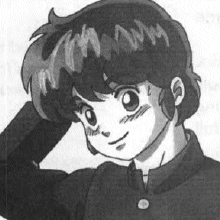
Tommy Tanaka
- Human
Smarts 5, Bod 4, RWP 5, Luck 6, Looks 5, Cool 1, Driving 3, Bonk 6
Knacks
: Convince Mom +1, Dodge +3, Look Baffled so they Don't Clobber You +2
Powers
: Incredible Luck
Traits
: Bewildered, Trusting, Modest
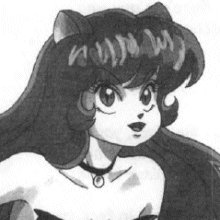
Rami
- Near Human
Smarts 4, Bod 5, RWP 4, Luck 2, Looks 6, Cool 6, Driving 4, Bonk 3
Knacks
: Look Adorable +2, Shoot Zap Gun +3, Get a Date +1
Powers
: Zap, Fly, Forcefield
Traits
: Curious, Stubborn, Jealous
... Yep, that's it, (almost) the entirety of a character sheet. They don't really get much simpler than that, except maybe in
Risus
. But there's one last "stat" to go over too, mostly avoided so far because it's something that's determined over time rather than at chargen. Specifically: your allowance!

 Roll 2d6, multiply by two (hey, 1987, inflation...), and that's how much you get per week. It's explicitly unrelated to how rich and powerful your character's parents might be of course, since they might just be stingy or hope that an after-school job will make you build character or something. The only upside is that before the first
Roll 2d6, multiply by two (hey, 1987, inflation...), and that's how much you get per week. It's explicitly unrelated to how rich and powerful your character's parents might be of course, since they might just be stingy or hope that an after-school job will make you build character or something. The only upside is that before the first
session
day of school, you roll another die and multiply your weekly total by that much to tell how much you've managed to save up ahead of time. And much like in real life, your allowance in TFOS is of critical importance because it allows you to
buy things
.
Every character is assumed to start with their own car, flying saucer, or equivalent thereof (hey, have to put that Driving stat to good use!) Problem is... it's also assumed to be an ugly, embarrassing, slow wreck of a used lemon unless you spend some money on it. Almost entirely fluff of course, but who doesn't want to have a cool paintjob and a car stereo?
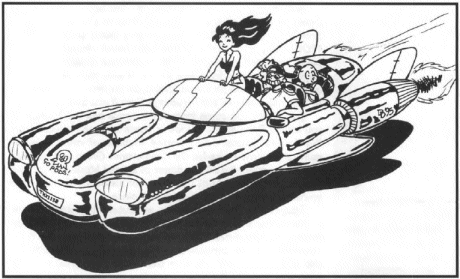
There's assorted personal goods that keep the wheels of capitalist society moving as well, including an assortment of fantastic (or not-so fantastic) alien devices like the
Zap Gun
(zorch someone for 2 bonk), the
4th Dimensional Purse
(which can store numerous things... assuming you can find them again), the
Boy/Girl Gun
(to help with
genre verisimilitude
), the
Sony Holoman
(Glasses that let you play videos from cassette tapes! Watch where you're going...), or the
Pangalactic Ghettoblaster
(can play any form of media, also loud enough to kill small animals). This is another place where players are encouraged to go hog-wild and make up their own
horrifying
amusing alien devices! Complete with some simple rules for creating them for characters of the appropriate hobbies. Success is not guaranteed, but awkward side effects likely are.
And of course, you'll need cash for visiting the movies, taking your dates out to dinner, and other such critically important social events. Which ultimately is why this seems to be tracked so closely for an otherwise rule-light game; being broke (or buying new stuff) can drive RP. Do you beg your parents? Do you get a job? Do you try and con your sister? Your girlfriend pay the dinner bill after driving her there in your old junker would make your social life in school
complex
after all...
For now, this brings us to the end of character generation!
 Next time, how to actually
play
the game! But we can't just leave it at that... I've been going on about how simple it is to make a character, so let's put this to the test. I'll roll up two sheets here, but leave the narrative traits unpicked, so to see who can make the most amusing characters from them! The winners will receive the undignified prize of being used in any gameplay examples that may come up later, as well as the undying adoration of the entertained thread! Hooray! All of this is rolled randomly with my actual dice, so put your creativity and experience with horrible old anime, cartoons, and webcomics to the max here... and if you actually own the game, hey, make your own!
Next time, how to actually
play
the game! But we can't just leave it at that... I've been going on about how simple it is to make a character, so let's put this to the test. I'll roll up two sheets here, but leave the narrative traits unpicked, so to see who can make the most amusing characters from them! The winners will receive the undignified prize of being used in any gameplay examples that may come up later, as well as the undying adoration of the entertained thread! Hooray! All of this is rolled randomly with my actual dice, so put your creativity and experience with horrible old anime, cartoons, and webcomics to the max here... and if you actually own the game, hey, make your own!
Human
Smarts 6, Bod 4, RWP 6, Luck 4, Looks 5, Cool 2, Driving 3, Bonk 3
Knacks: (2 points to distribute)
Power: Connections (You know lots of people, and can get lots of favors... and probably get asked to
give
too)
Near Human
Smarts 4, Bod 3, RWP 2, Luck 2, Looks 2, Cool 2, Driving 3, Bonk 5
Knacks: (4 points to distribute)
Powers: Teleport, Monster Out, Superstrength
Real Weirdie
Smarts 2, Bod 1, RWP 1, Luck 5, Looks 2, Cool 6, Driving 6, Bonk 2
Knacks: (6 points to distribute)
Powers: Fly, Shapechange
How to actually do stuff!
Original SA post TEENAGERS FROM OUTER SPACE - How to actually do stuff!
TEENAGERS FROM OUTER SPACE - How to actually do stuff!

Sidebar posted:
If you've come this far, it's too late; you might as well play the game.
Now, as I've implied, TFOS isn't... horribly complex here. It's definitely geared towards explaining the details of RP more than having rules for same, probably because it's exceptionally rules-light for the era so you couldn't just play it half like a board game like you could get away with in AD&D. So what's actually there for mechanics is... well:
-
Actions:
Everyone gets to do one thing per turn. Be it "zap someone", "bribe a teacher", or "crash your UFO".
-
Initiative:
"Pretty immaterial", with heavy encouragement that it doesn't really matter and that you should just draw straws or go clockwise around the table or whatever.
-
Rolls:
Pick an appropriate stat (Bod for zorching someone, Drive for trying to do a sweet handbrake turn, etc). Add any applicable Knacks. Roll a die. If you're competing against someone, it's a contested roll against whatever seems most fitting. If it's just difficulty related, the referee picks a target number from 1 (trivial) to 10 (nigh impossible). Highest numbers wins, Ref wins on ties. And that's... it, really.
 Okay, so... it'd be something like 1d6+4 if I wanted to startle someone, right? Looks plus the "+2 scary girl" knack. Probably a contested roll against their Cool.
Okay, so... it'd be something like 1d6+4 if I wanted to startle someone, right? Looks plus the "+2 scary girl" knack. Probably a contested roll against their Cool.
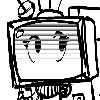 And Driving and my "I can fix it" knack to make sure the UFO's still running! 1d6+8! Probably against a target number unless someone rigged it with a booby trap! Nothing can
possibly
go wrong.
And Driving and my "I can fix it" knack to make sure the UFO's still running! 1d6+8! Probably against a target number unless someone rigged it with a booby trap! Nothing can
possibly
go wrong.
 ... And just a straight Luck roll, 1d6+4, to make sure I'm standing
over there
when something explodes.
... And just a straight Luck roll, 1d6+4, to make sure I'm standing
over there
when something explodes.
And really, between the chargen rules and these bits, that's all players really need to concern themselves with. Handy, isn't it? The only issues is that this isn't all the rules, and referee obviously has a bit more to concern themselves with, but a lot of it's just finer explanations for questions that might come up in game when people don't really... get how TFOS is run. For example:
-
How long is a turn?:
However long it takes the players to do their actions.
-
Who gets to go first?:
Doesn't really matter. There's advantages to only going after everyone else has made idiots of themselves anyway.
-
How much can I do in a turn?:
One thing. It may be a complex thing, but it's up to the ref.
-
Is it in range of my attack or whatever?:
Everything is in range. At all times.
Everything
.
-
Can I outrun that flying saucer?:
Mostly a common sense thing. Obviously faster entities are going to win (someone with superspeed versus some poor human), but if it's not clear both competitors in the chase just roll a die, the higher gets a lead... for that turn.
-
What happens if I miss an attack?:
You still hit something... or some
one
. Everyone rolls luck,
lowest
gets hit, even if it's an ally. Retaliation is highly encouraged.
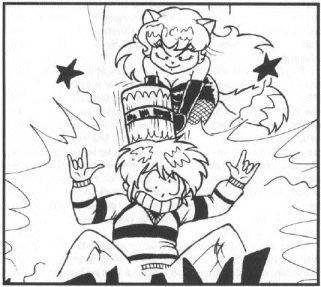
Damage (or rather, Bonk loss) is another slightly more complex bit, in that doesn't quite work as traditional hit points. As noted back in the first post where I explained the stats, there's no real downside to being bonked out besides losing some turns (and more worryingly, your dignity), but it's critically important to note that you don't only lose Bonk from being attacked physically. Verbal attacks and other means of stripping someones dignity is perfectly allowable as well.
 The amount of Bonk lost depends on a few things. Some powers and equipment just cause a flat "damage", like the Zap power doing 2 points. Failing that, flailing at someone with your fists, wits, or whatever else is handy does 1 point. The referee may just assign some Bonk loss (1-3) if the players do something particularly incompetent to themselves but isn't quite an attack (such as flying into a wall.
The amount of Bonk lost depends on a few things. Some powers and equipment just cause a flat "damage", like the Zap power doing 2 points. Failing that, flailing at someone with your fists, wits, or whatever else is handy does 1 point. The referee may just assign some Bonk loss (1-3) if the players do something particularly incompetent to themselves but isn't quite an attack (such as flying into a wall.
Or... if you're feeling
A special situation is listed for anyone who actually tries to use serious weapons. Guns, knives, all that sort of stuff. In addition to sort of missing the point of the exercise (aliens or not, it's still a came of high schoolers here), the target has to roll their Cool, and if they fail they go running screaming for cover. It doesn't really matter anyway, since "real" weapons don't actually inflict any harm besides awkwardly torn wardrobes. It's just not that kind of game, you know?
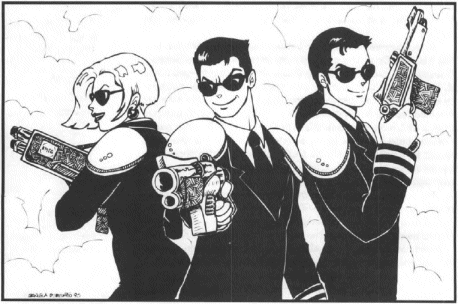
The last really "complex" rule is Experience Points. The game admits that it isn't really necessary, and you'd probably have better luck training your players by tossing them M&M's or something when they did something funny. But there's still some chance for progression if they insist , at least. Stats can't be changed, but you can raise or buy new Knacks whenever you want, spending your Life Experience on a 1/+1 ratio. And how much of that do you get? Well... it's vote time again, where everyone (secretly! And including the ref) gives the each of the other players a 0-3 vote, and the average result is what experience they get. If anyone complains, well, it's not the Ref's fault, it's a democracy ...
Eric Wujcik would be proud.
 Of course if you wanted to move this away from somewhat confrontational gameplay, it wouldn't be too hard to houserule just giving a flat amount, or leaving the vote open. If you're playing TFOS right, there's probably a few moments everyone loved and would want to reward anyway!
Of course if you wanted to move this away from somewhat confrontational gameplay, it wouldn't be too hard to houserule just giving a flat amount, or leaving the vote open. If you're playing TFOS right, there's probably a few moments everyone loved and would want to reward anyway!
In any case, we're done with the rules for now, but that's only part of the Referee advice - and we're only halfway through the book. Next time we'll some advice on how to run this crazy game, since keeping to a crazy humor theme is probably a bit difficult if you're used to crawling through dungeons with murderhobos.

...
And completely unrelated to this writeup: translations and reviews of foreign games is amazing and I highly encourage it. It's one thing to pull old american games out of the bin, but most people here have never even seen stuff like that.

Getting funny!
Original SA post TEENAGERS FROM OUTER SPACE - Getting funny!
TEENAGERS FROM OUTER SPACE - Getting funny!

Now, for some context, back in 1987 the concept of "genre emulation" didn't actually exist, at least not in the idea of a singular specific concept that a designer would actually create rules around. Don't get me wrong, there were a lot of games that were testing the waters of trying to emulate the "feel" of a genre or medium rather than simply being a game in a setting (an early example I own would be 1984's Marvel Super Heroes where XP (karma) was explicitly tied to acting heroic, and I know there's many similar examples from around and before that time), but oftentimes these rules tended to be experiment or insufficient, and often came with the assumption that players would already know the genre/setting and at least make a vague attempt of emulating it. Which presented a problem for a game like TFOS, since it not only had a playstyle that wasn't very common for the era (narrative and comedy-focused), but it was for a genre that was easy to grasp but not quite common knowledge.
The answer to this problem? A big section on how to properly run an humorous anime game.

It's a bit more complex a problem than it sounds, mind you. The book needed to cover both how to actually try and get the feel of play down, while also trying to explain the tropes of the genre (not in as many words of course) in order to play them right. Nowadays a lot of this might just go unstated, but honestly it's pretty nice to have, and TFOS has some pretty good advice. For the most part anyway. It winds up as one of the longer sections of a somewhat short book, but for good reason. And to start off, it goes into advice in how to do the metagame right, something that you don't see often. Listed things include:
-
Getting Physical:
Some simple but silly advice... which is important for a silly game anyway. Some encouragement to go and overact, gesticulate wildly as you explain what your characters are doing, scream in horror as your characters scream in horror, and other such things to try and keep an open and outgoing mood. In what would likely be shot down by liability lawyers these days, it even encourages the referee to throw things at players who are appropriately Bonked.

-
Maintain a manic pace:
I really appreciate this particular item since it's something that is almost always forgotten in GM advice. Pacing is important! Speaking as an old and crotchety game master, you absolutely want to have things going and people acting as often as possible, and if there's any periods of dead air then something has gone horribly wrong. Granted, this is an old game, so most of the advice is along the lines of dropping something to shake up the players (like the sudden intrusion of a horribly obnoxious and repulsive classmate) if they dither around too much. Which I admit is not entirely ineffective...
-
Steal shamelessly:
TFOS also encourages both referee and players to, well, steal characters and jokes and skits from whatever's been most amusing lately. This is one of those moments where you're reminded that this game came out in the 80's, well before that "internet" thing was a household word and any comedy game would inevitably be inundated with internet memes. You had to settle for
where's the beef!?traditional word of mouth memes instead.
-
Use running jokes:
Somewhat similar to the above, but honestly more important for a comedy game since it tends to be an easier sort of humor to work with at the table. This piece of advice is also
absolutely amazing
solely for the given example;
Behold. Teenagers from Outer Space.quote:
For example, one of our players attempted to grow a mustache. His success roll was so incredible the Referee determined he had not only grown a mustache - he had grown the Ultimate Mustache! For weeks afterward, the mustache jokes flew fast and furious. Girls asked his mustache out on dates. Tiny mustache-shaped aliens began to worship his fringe as a god. Articles on his mustache began to appear in Time and Newsweek ("Man and Mustache in America"), People ("Doug's Mustache tells all!"), the National Enquirer ("Mustache in Love Triangle with Liz and Jackie - Flees with UFO princess!"), and even National Geographic ("Expedition into the Deepest Mustache"). The final blow came when the U.S. Government nationalized his face as a "Treasure of the American People", placed a 24 hour guard around it, and least oil-drilling rights to his hair.

-
Dare to be stupid:
While somewhat anticlimactic after that, it's still important advice. TFOS is quite intentionally a stupid game, and should be played as such.
From there, the book moves into what it calls "Routines", but what we'd probably refer to as
-
The Principal:
A mysterious and ultimately terrifying entity. None dare speak of him/her/it, and merely being called to their office results in a (mostly ceremonial) 10 Bonk.
-
The Vice-Principal:
Somewhat more public, but no less visible and terrifying. Something the players should avoid interacting with at all costs, but at least have a vague chance of escaping without detention.
-
The faculty:
Examples are given for the various sorts of cliché teachers you'd find in this sort of thing, from the (Mad) science teacher to the helpful Shop class teacher to the hot Art teacher who isn't very good but has a mysteriously popular class for some inexplicable reason.
-
Hall monitors:
Obstacles to be avoided. Likely heavily armed, and getting moreso as the protagonists escape time and time again.
-
Alien control officers:
The somewhat pathetic attempts by the world governments to try and do something about all the alien teenagers blatantly running around, and who mostly exist to be thrown into an ongoing altercation by a mean referee in order to turn an orderly bout of violence into a chaotic clusterfuck of property damage.
-
The Parking Lot:
Teenagers aren't very good drivers, alright?
And from there, to assorted off-campus problems! A prominent one, right at the top of the section, is... well, sex . Fear not, this isn't some creepy horror like Cthulhutech or what have you, and TFOS is quite up front with how this is supposed to work:
quote:
Skip the moral questions. Sex, in a roleplaying context at least, just isn't funny enough. Now frustration ... that's funny.
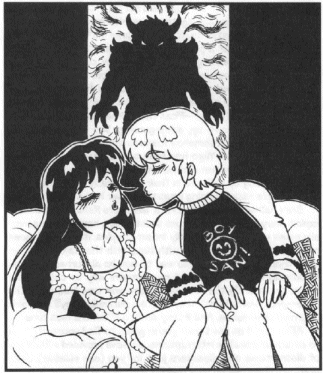
While most of the following advice is stuff that would be readily obvious to anyone who's ever watched a sitcom, a romantic comedy, or a harem anime (you poor bastard), it's still helpful to be reminded that the most amusing part of sending teenagers on dates is watching them go horribly wrong, and there's a handy sidebar full of things that could conveniently interrupt a romantic liaison, from "a phone call" or "parents come home", all the way up to "comet hits earth" or "Godzilla escapes". Naturally this is yet another area where one's RWP score is likely to get put to the test too...
From there, it goes into other examples of things that might make a teenager's life difficult. From horrors like "having to take the bus because your UFO broke down" or dealing with the media (if you're some famous figure or alien), to simple things like one's parents. The example Mom given has the single stat of Guilt +10 , but like everything else in TFOS it's pretty obvious how you could spin this a variety of ways, or insert other family members to make one's life difficult.
 Going to be honest, my mom's in politics. She's pretty cool, lets me do whateeeever I want!
Going to be honest, my mom's in politics. She's pretty cool, lets me do whateeeever I want!
 The less said about mom, the better. But she's an
amazing
cook, really great with barbeque, roasting things on spits, that sort of stuff...
The less said about mom, the better. But she's an
amazing
cook, really great with barbeque, roasting things on spits, that sort of stuff...
 "Mom" is a the ruling AI of planet M3CH-A. ... I should probably phone home though, she might be getting worried. I know she's usually too busy sending those giant robot monsters to try and conquer earth, but she means well.
"Mom" is a the ruling AI of planet M3CH-A. ... I should probably phone home though, she might be getting worried. I know she's usually too busy sending those giant robot monsters to try and conquer earth, but she means well.
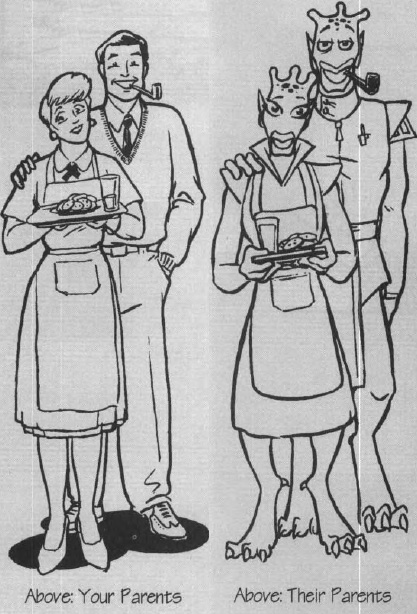
Most of this stuff is things a modern player could think up with ease, what with all our narrative driven games and whatnot. But it's still handy to have, and if nothing else it makes for some good reading and helps in giving advice. A TFOS character is arguably more about their interactions with family, fellow students and faculty, and the world around them than about their own stats and scores, and that's a good thing. It makes for a better game, even if it's not about crazy students from space!
And next time... sample adventures and advice on how to make your own adventures and campaigns! Yeah, honestly we're almost done, but this is only a 78-page book.

Getting down to business!
Original SA post TEENAGERS FROM OUTER SPACE - Getting down to business!
TEENAGERS FROM OUTER SPACE - Getting down to business!

Why do games tend to not come with sample adventures any more? I guess it is a bit of a waste of space, but it does tend to be handy. Ah well! We're down to the last quarter of the book here, and honestly I'm going to skip over most of it; it's not like this is a game where there's deep metaplots or something, and I'm assuming anyone reading this on this forum could think up a dozen sort of scenes to alien teenagers in trouble in without much effort. There's a single sample adventure (TFOS even gives some sample characters for people who still aren't used to this "RPing" thing, but we already have our own.
 ) and more general GM advice afterwards.
) and more general GM advice afterwards.
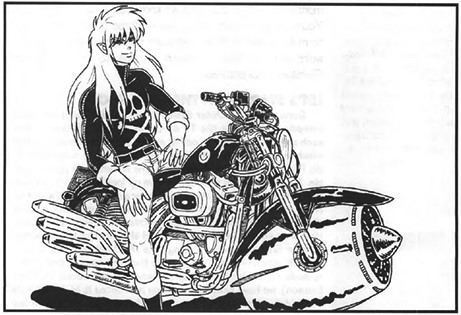
Our sample adventure? Enter the Drag Race , just in case you were still worried about the utility of that Driving stat. To start off, <character's> long-lost sibling gives them the gift of a sizable amount of debt and a wrecked-up old star racer. Fortunately there's the upcoming Galaxy 5000 race with its sizable prize that could certainly get our hero(ine) out of trouble, and surely her friends would be happy to help! Of course, you can't enter with a wrecked racer, and even if the teens can scavenge some parts off their own vehicles they'll still need to borrow (or steal...) a bunch more. Not that it's even that simple, since assorted rivals from the race would want to make sure the previously prize-winning UFO doesn't get back into the race. And even if the teens manage to get through all that, there's still the matter of winning ...
 Don't worry, this is my specialty!
Don't worry, this is my specialty!
 It better be, considering your mechanical family started this mess to begin with...
It better be, considering your mechanical family started this mess to begin with...
It's also important to note the book provides active encouragement to completely ignore this scenario if it spins off in a weird and amusing direction. And it's the only fully written-up scenario, short as it is... but fear not! For the book continues to provide plentiful advice on making your own adventures. This sort of GM advice is almost universal these days, but again it's important to remember that TFOS was in an... unusual niche back in the day (and even now, to a degree) so having all of it written out was a good idea.
Sidebar posted:
Each Teenagers session should be like a half-hour episode from a T.V. show. Fast, direct and mindless. Don't worry about whether the players follow the scenario you set up or not. They only came to eat your popcorn, drink your Cokes, and trash your living room for the weekend.
The main thrust of the advice is to treat writing the adventure like writing a television script... or at least a sitcom scenario. You need the situation, the cast (the feature cast (PCs), supporting cast (major NPCs), and guest stars (NPCs important to the scenario)), and the major scenes that make up the plot (including the theoretical goal of the teens, even if things may well get derailed early on). It gives some examples of how to lay out rough scenes (in this case, the teens finding a stuffed animal that is actually the vanguard for a fluffy invasion force, and the ways this... escalates as they go along), but this is basic advice, even if coming at it from a scripting direction rather than the classic D&D "here's a dungeon to clear" angle is still useful to consider.
There's also some guidance in how to run a longer campaign (a "movie") rather than a one-shot scene (the "episodes" above). Again the advice is obvious... even if the reminder to end sessions on a cliffhanger is probably useful for any sort of campaign, not just TFOS.
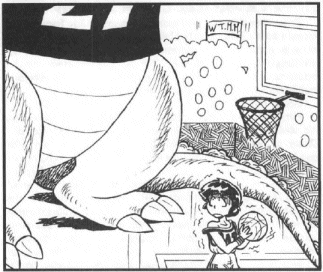
Oh, and of course there's the usual photocopiables at the back. Not just the character sheet, but also some little cards to help with the "create strange gadgets" thing and some sample Space Dollars to help your players keep track of their budget, Monopoly-money style.

But wait, isn't there a later version of this book too?
Well... yes! In 1997, ten years after the reprinting of the original book, R. Talsorian put out a new version of TFOS. Overall the text isn't a whole lot different, and large portions are pulled straight from the original edition... not exactly a surprise, since there's not a whole lot of rule complexity to update and expand upon. But what is changed? Not to get too specific, but...
-
A horrible eight-page comic at the front.

-
A sample "adventure" right at the front... or rather, a little solo exercise to try and get new readers into the mindset, a "choose your own adventure" follow-the-numbers deal. Not very useful in teaching the rules, but shows "all you have to do is play the part of a Teenager and make decisions."
-
More and different sample characters, each with a full page writeup and more art. Also lots more teenage girls in miniskirts and things, but that's probably straying closer to the source material...

-
A sidebar with conversion to Fuzion for the two people who actually gave a fuck about Fuzion and also thought it'd be a good idea to port TFOS to it for some unfathomable reason. Sorry Pondsmith, it didn't work out very well.
-
More powers! Not... a lot more, but there's five tables instead of three and players randomly roll from any three they like, adding a little more variety. Human talents are unchanged but that's what you get for playing someone normal you know?
-
A little more detail in the equipment section, including explicit permission to have weirder vehicles (yes, you could tool around in a giant robot or strap a hyperdrive to a Buick if you want) and more... weird gadgety things listed.
-
The rules and GM advice section are mostly identical, but there's a new section about explicitly anime
tropesroutines if you wanted to push that angle, which is honest but horrible. Well, at least ~moe~ still wasn't really a thing in 1997...?
-
The sample adventure's a bit longer and plays off the setup in the starting comic. Makes sense, though more animeish, yes.
So... overall?
I regret it's a short book, it was fun to re-read and review. I almost sort of want to see a campaign now.

To reiterate my thoughts from the prior thread, I hadn't actually read it in over a decade, and I was sort of expecting it to clunky and archaic, but the staggeringly simple and permissive rules are if anything even more useful these days, now that concepts like "genre emulation" and "narrative control" are things that people actually think about when setting up a game. TFOS has held up surprisingly well, a lot better than most 25-year-old games, and what few problems it might have are easily fixed with one or two simple house rules. I highly encourage folks reading this to go pick it up, especially since all three versions are under $25 or so on Amazon right now. Go! Do it! Own something from gaming history that you could actually play now without feeling like the groggiest of nards!
